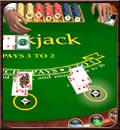Blackjack Rules - History
 Blackjack is by far the most popular card game in modern casinos across Europe and North America. Like many well-established games, its origins are not well documented. Most scholars consider Blackjack to have some roots in a popular card game found at casino tables in 17th Century France, called Vingt-et-Un (20 and 1), hence its other common name: "21". Blackjack is by far the most popular card game in modern casinos across Europe and North America. Like many well-established games, its origins are not well documented. Most scholars consider Blackjack to have some roots in a popular card game found at casino tables in 17th Century France, called Vingt-et-Un (20 and 1), hence its other common name: "21".
There are candidates predating Vingt-et-Un, but most are poorly documented.
The pre-revolutionary French taught the game to English sailors, soldiers and merchants, who christened it "Blackjack" because of a special rule regarding what was considered the ideal hand in Vingt-et-Un: A player who held the Ace of Spades (i.e. a Black spade) and the Jack of Spades as the first two cards of his hand would be paid out extra.
The English gambler's penchant for easy rhymes took over (think "chuck-a-luck", "acey-duecy"), and Black Jack was hard to resist.
Soon, Blackjack migrated to North America, where it gained a wide audience in the 18th Century among the colonists and then spread west through the 19th Century with the migration of pioneers.
When Nevada legalized gambling in the early 20th Century, Blackjack was a mainstay of Las Vegas casinos. Since then it has evolved into many variations, as different casinos and different geographic regions adopted their own particular sets of rules.
As you would expect from a global online casino, we offer a number of Blackjack variations from all over the world, including:
-
European Blackjack
-
Vegas Blackjack
-
Classic Blackjack
-
6-Deck Blackjack
-
Double-Deck Blackjack
-
Single-Deck Blackjack
-
Surrender Blackjack
-
Live-Aces Blackjack
-
Anything-Goes Blackjack
-
Blackjack Swap
-
Barcelona 21 Blackjack
-
Super Play 21 Blackjack
|